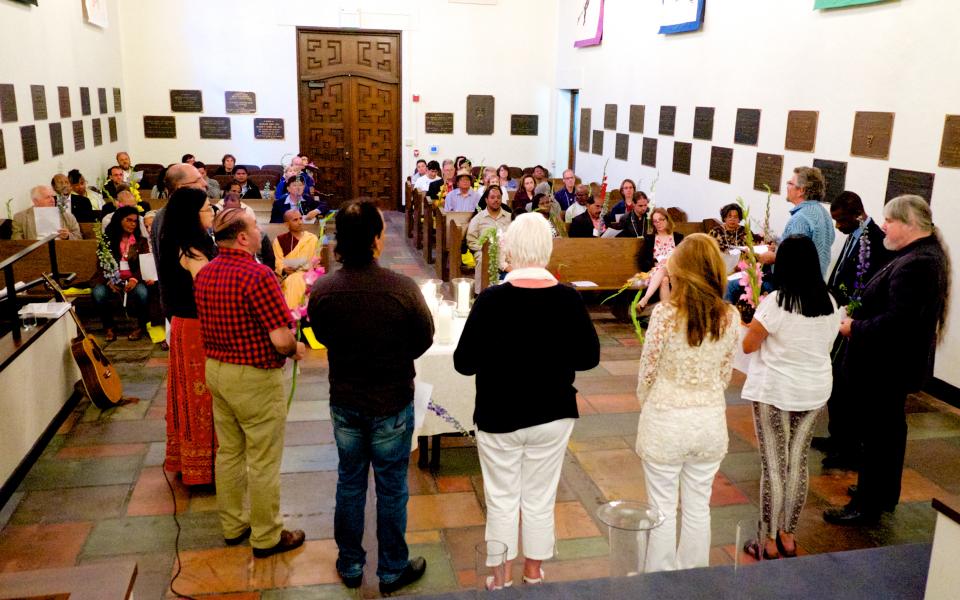
(This post was published on UPLIFT and the WorldPost (a Huffingtonpost partner) with permission from the author, Jacob Devaney.)
Across the globe it is becoming clear that nations are failing at creating peaceful solutions to international challenges. More bombing does not create more understanding, communication does and we have an unprecedented opportunity to exchange ideas across borders thanks to the Internet. We are at a crossroads in history where it has become apparent that the "old" ways of doing things are no longer working in our modern world. An open willingness for this old dog to learn some new tricks has become an imperative for a peaceful, sustainable future. Rebecca Tobias, a Global Council Trustee for North America with United Religions Initiative, introduced me to the term "peer-to-peer diplomacy". This is something that we need right now and every one of us has a part to play in this process.
On Thursday, January 29, CODEPINK protesters spoke out during Senate Armed Services Committee attempting a citizens arrest of Henry Kissinger. The publicity stunt drew a lot of international press and attention to a need for change in the way that we conduct foreign policy. CODEPINK National Coordinator Alli McCracken (26 years old) stated: "We need to stop rehashing these tired old war criminals and come up with a new foreign policy based on diplomacy and compassion -- two things Kissinger knows nothing about."
In stark contrast before, the same Senate Armed Services Committee Former Secretary of State George Shultz stated that people, not solely leaders, need to be talking to each other. He highlighted the need for non-military solutions and praised the United Religions Initiative in testimony before the United States Congress. You can see the video and learn more at this link.
Responding to Shultz's testimony United Religions Initiative Founder and President, Bishop Swing stated:
"In the space between one religion and another religion, there is often a hard history of grievances, memories of coerced conversions, and competing claims of ultimate truth. So the space between religions is often toxic. This toxicity drags neighborhoods and regions into religious strife that stymies daily life, sometimes leading to intimidation and, in the worst cases, horrific spectacles like beheadings.
URI's purpose is to fill the space between religions with interfaith bridges so that the grassroots people of all faith traditions, indigenous communities and humanistic groups can cross over, and discover other believers, and take positive actions together. URI is not a religion, nor a United Nations of Religions. URI is grassroots and singularly tries to fill the void between religions with something that the world needs desperately: bridges between cultural, religious and spiritual differences.
Religions are about salvation. URI is about civilization. People around the world have responded to this mission of URI; in a few years, URI has expanded to more than 675 Cooperation Circles in 85 countries, touching the lives of over three million people daily."
There are a number of grassroots efforts that are taking to social media to undermine the dominant military paradigm for addressing international issues. One of them is the Peace Factory, who is building a bridge of communication between the people of the Middle East. Ronny Edry, a graphic designer who started this project by making a simple but profound picture of himself with his young daughter that says, "Iranians we will never bomb your country" and posting it on Facebook. The results went viral and people began sharing similar messages across social networks from countries around the world!
If you want to make peace, you don't talk to your friends. You talk to your enemies. ~Moshe Dayan
It is as simple as changing the story, creating new images, breaking down stereotypes, and sharing inspiration. Dialogue can happen with an image, a hashtag, a blog, it comes with a willingness to listen, to see the humanity in each other and stop buying in to the continued demonization that is spread through mainstream media. We can no longer wait for leaders to act towards peace, the power is in the hands of the people.
Those who love peace must learn to organize as effectively as those who love war. ~Martin Luther King, Jr.
The top-down diplomacy of nations has failed at bringing peace, it is up to the people to build these bridges. Ronny's story is only one story, what will you do to create peer-to-peer open-sourced peace? Whatever ideas you have for this must allow for others to contribute with their voice and combining your efforts with media is always a plus. If you know of different projects like this, please tell us in the comments below! This is our moment to let our love and compassion transcend national, cultural, and religious boundaries to create the peace we all desire. Now the story is changing and it is being written by the people, we can't wait to hear from you...
